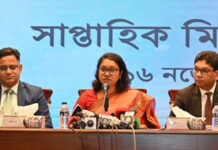
The appalling traffic congestion that Dhaka dwellers suffered on Saturday and Sunday was the result of a trial of new electronic traffic signal system installed for the second time, wasting crores in taxpayers’ money.
In the last 11 years, the government spent Tk 37 crore on the traffic signal system in the capital.
In 2004, Tk 14 crore was spent for installing a signal system. The money went down the drain as it became ineffective within days. And traffic police had to control vehicular movement with hand signals at intersections in the capital.
The government initiated a fresh project in 2013 for installing countdown timers alongside the set of lights at intersections for Tk 23 crore.
Last year, trials of the timers were conducted twice at two points; congestion increased and there was chaos, prompting the city corporations to delay implementation of the new system.
But the latest trial was by far the worst. On Friday, traffic police began the trial from Kakoli intersection to Shahbagh. The following day, there was nagging traffic congestion on the thoroughfare and it quickly trickled down to other streets. The picture was the same on Sunday.
Traffic police was forced to stop the trial yesterday morning.
According to sources in the two Dhaka city corporations, the project to install the traffic signals was taken only for financial benefits of some local companies and a section of officials of the corporations.
They said the fresh system was installed when the lifespan of the existing system is to expire in 2024. Under the new scheme, countdown timers and solar panels had been installed at 70 locations, with 30 more to go.
“This is nothing but a mockery … I don’t understand the meaning of countdown clocks when none follows the traffic signals,” said Shamsul Hoque, a professor of civil engineering at Buet.
“The prerequisite of any digital traffic signal is that people follow the signals,” the urban transport expert told this correspondent.
“If people do not follow the lights, they are not going to follow the timers either.”
He said countdown timers are used in countries where people follow traffic signals.
Experts said neither signal lights nor timers would be effective in a city where motorists and drivers are least bothered about the signals.
Movement of VIPs, political and social programmes on streets, driving on the wrong side and unpredictable traffic volume were also behind the failure of the government initiatives, they said.
When the government decided to install digital traffic lights in 2004, experts had opposed the move considering the ground reality. But their opposition was ignored.
The signal system had an option for manually overriding the timing for the lights in case of increase in traffic volume at an intersection. Instant Power Supply (IPS) was also installed to keep the system operational in case of power cuts.
The government hired an Australian firm to maintain the system.
Project Director and Dhaka South City Corporation Executive Engineer Shehab Ullah said the new timers with related equipment were imported from India. Solar panels were also installed for ensuring electricity supply during power cuts.
A few months ago, he told The Daily Star that he was not sure about the system’s effectiveness.
Chief Executive Officer of DSCC Ansar Ali Khan had then said, “Once the system is operational, we will know whether it will be effective or not.”
The two officials played a key role in formulating the new scheme.
Ansar claimed that people were confused by the lights. But they would understand the timers and be able to assess the time required for their journeys.
When asked what if it did not work, he said, “The responsibility for executing the system lies with the police [traffic] department.”
Talking to this correspondent yesterday, Joint Commissioner (traffic) Mosleuddin Ahmed said they requested the city corporations to find an effective solution as the new traffic system proved ineffective.
“We need to study to figure out what system is applicable for a city like Dhaka.”
He stressed the need for proper synchronisation of signals at intersections, preventing illegal parking, rallies and procession on streets, stopping people from driving on the wrong side and jaywalking, and introduction of a proper public transport system.
As many as 17 traffic policemen — five sergeants and 12 constables — died while on duty since 2004, according to the police department.
Source: The Daily Star









